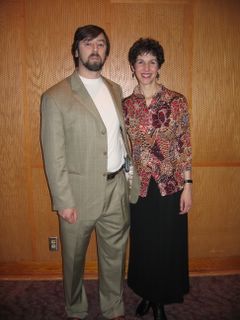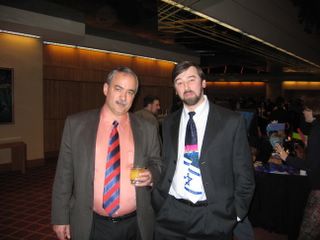 Nonie Darwish visiting Minnesota
Nonie Darwish visiting Minnesota
Nonie Darwish was visiting the Twin Cities area on Sunday, April 10, 2005. She is one of the few people on the Arab side of the conflict who is really looking for opportunities for peace and coexistence with Israel. Her group has a wonderful web site where one can learn more about the group (www.arabsforisrael.com).
They can also use any help they can get – it is amazing how few people know about them including in the Jewish community.
Nonie, who has a great grasp of realities in the Middle East, also has some very good ideas on how to improve these realities. One particular idea came across my mind yesterday as I was reading Sharansky’s latest book: Nonie said that while the Saudis and other Muslim governments have the free right to channel money into the U.S. in order to create a following here, this exchange of ideas is unidirectional: as far as she knows, and I have no reason to believe otherwise, there is no real freedom of press and association in any of the Arab countries, and thus no real movement to support the peace efforts of the U.S. Government. Sharansky has exactly the same opinion and a very similar recipe: link the ability of the Arab Governments to support any legal organizations in U.S. with the ability of U.S. Government and NGOs to support human rights organizations in Arab countries.
Visit http://www.arabsforisrael.com/ for more information about this wonderful person
Nonie Darwish with Joanne Magnusson from Bridges For Peace, Lydia and Semyon Axelrod 
Tuesday, September 20, 2005
Tuesday, May 31, 2005
Meeting Robin Helzner
Although Robin Helzner is best-known for her brilliant and inspiring performances, a lesser-known fact is that she was in her own way instrumental in facilitating the return of Jewish culture to the Soviet Jewry.
I was privileged to have first met Robin at the opening of the Solomon Mykhoels Cultural Center in Moscow in February of 1989. She was one of the four performers that Edgar Bronfman and Isi Leibler were allowed to bring to Moscow and Leningrad to perform at the opening of the first Jewish cultural center in over 60 years. It was one of the first performances of Hebrew songs for a large audience in the Soviet Union since the 1920s. While the other three performers: Yaffa Yarkoni,, Aura Levin, and Dudu Fisher were on the planned roster for the official inauguration of the Cultural Center from the very beginning, Robyn Helzner was added to the program at the very last moment. Later, she told the story behind her sudden appearance on the program. It turns out that Robyn was traveling as a tourist in the USSR a couple of months prior to the opening of Solomon Mykhoels Cultural Center . She got a couple of addresses of the refusenik leaders from the groups working with the Jewish activists in the USSR. She was able to connect (by following almost James Bond-like techniques) with the activists in Moscow and performed in a couple of filled beyond capacity apartments. She made an enormous impression on her audience, and Yuli Kosharovsky was able to convince Bronfman and Leibler to add her to the program.
A few days after the historic concert, I was also able to arrange a meeting between Robin and an underground Leningrad Jewish band “Haverim”. Robin met the group members at the apartment of Rita Turetskaya, the band’s lead vocalist. In requesting that Robin performed with them, the group was hoping to get a much larger venue for the event than they normally would have been able to book and also to advance a tricky toil of Jewish cultural rebirth in the USSR. Robin was very kind to agree to perform with the group on such short notice and without compensation. With the concert scheduled to take place within two days, we feverishly started looking for a concert venue and miraculously found a hall suitable for 800 people.
The group then ordered radio ads and started to sell tickets. Alas, what was permitted for a Jewish American singer was not permitted for a joint performance with an underground local Jewish band. “Somebody” called the concert hall and ordered the performance cancelled. The hall administrator unenthusiastically complied – a call from the KGB in 1989 Leningrad was still an “offer they could not refuse”. So although the joint performance didn’t take place, both Robin’s visit to the Soviet Union and her brave interaction with underground Jewish activists served as a great boost to the morale of the entire Jewish community in Leningrad.
Saturday, May 21, 2005
Sunday, April 10, 2005
 Nonie Darwish visiting Minnesota
Nonie Darwish visiting Minnesota
Visit http://www.arabsforisrael.com/ for more information about this wonderful person
Nonie Darwish with Joanne Magnusson from Bridges For Peace, Lydia and Semyon Axelrod 
Saturday, April 09, 2005
Thanks to Bill Heyman
Bill has posted a link to an extremely interesting article about the psychological foundations of human society types. The main idea is that totalitarian societies are very sensitive to loosing to what is commonly misconstrued as “honor” while democratic societies are much more sensitive about the possibility of hurting others and as a result tent to make compromises and even forfeit some of their intrinsic values, i.e., equality of all the groups in a society.
Here is an abstract from the article: to read the full piece please visit:
www.sullivan-county.com/immigration/e5.html
“Human societies can be loosely divided into two groups: those governed by shame and those governed by guilt. Though often conflicting, guilt and shame are both normal functions of the human psyche. In different individuals and societies, how-ever, one or the other may predominate.
Guilt-dominant individuals tend to mistrust their own native aggression, and they will act to protect others from it.
When they are in the majority, they tend to maintain societies that will go to war only after they have been attacked. Tolerance, moderation, and charity are the official virtues of "guilt" societies, and play a part in shaping their educational practice, legislation, and foreign policy.
By contrast, shame-vulnerable individuals are constantly vigilant toward aggressions of others against their sense of honor. If insulted, they feel humiliation and rage. The shame-prone willingly submit only when the external power appears so invincible that there is no alternative but surrender. Beneath their outward defiance, the shame-prone often hold unconscious yearnings to be submissive; the seemingly omnipotent conqueror allows them to be passive without shame. “
Monday, March 14, 2005
Meeting Walid Shoebat or old news we should start paying attention to
Last week I was invited by a friend to attend a Torah Academy of Minneapolis 2005 annual banquet. The featured speaker was Walid Shoebat, a former terrorist member of the PLO, and now an outspoken supporter for the Israeli cause and a guest speaker for the Jewish school fundraiser?! I was intrigued. Before attending the dinner, I visited his website and was very pleasantly surprised by what I saw, as well as by the materials posted on the linked Arabs for Israel site. So I was looking forward to the event not only to have a dinner in the company of good friends accompanied by a glass or two of Yarden merlot, but also to validate for myself if Walid Shoebat is indeed what he’s been presented to be. I am a pretty skeptical person by nature, and growing up in the country where doubletalk was the norm taught me a couple of things on how to tell the difference between the genuine and a forgery. In my little less than 50 years on this Earth, I have been also blessed with meeting and talking to some extraordinary people. By extraordinary I specifically mean that the views, achievements, and/or approaches of these people were somewhat different from the established and commonly accepted views of the majority. I would like to think that most of the times I was accurate in judging whether these people were sincere, or whether they were just pushing “the Emperor’s New Suit”.
I strongly believe that Walid Shoebat is in fact an extraordinary man who is extremely sincere in his intentions. I also felt a kind of a special bond to the person who was born in a “prison of hate” and was able to break free. I do not want to regurgitate his story and his views – you can read about that on his website. However, I would like to share with you one of the key insights about the Jewish community that Walid Shoebat, an outsider, shared with us.
He started by referring to one of the well-known traits of the Jewish people – our unwavering optimisms. He continued by pointing out that while in general it usually helps to be an optimist, in the current realities of the Middle East, this overly optimistic approach in reality is hurting Israel’s chances for a peaceful settlement. According to Mr. Shoebat, in the Middle East in general, and in the Arab world in particular, “might makes right” is still very much the law of the land. Mr. Shoebat has also suggested that the peace effort will be better served by trying to make sure that Israel’s enemies respect her power, and that “your friends can count on your support and strength rather than by making one concession after another to your enemy without getting anything back in return”. He also pointed out that the Jewish desire and hope for peace has blinded Jewish community and is playing against us by forcing us to see a mirage of goodwill and reciprocity, when in fact there is nothing of such kind. Based on his personal experience and familiarity with the education system in Arab countries, Mr. Shoebat insisted that there will be no real peace until the whole system of education in Arab countries is dismantled and rebuilt. Providing more concessions to the terrorists will only affirm their belief in the legitimacy of their actions.
There was nothing particularly new in anything that Walid Shoebat told his audience. Most of us were well aware of the incitement being taught daily in the Arab schools, but it sounded even more convincing when it came from a person who was the product of this system himself and knew it first-hand.
As if to prove of Mr. Shoebat’s point about Jewish unjustified optimism, somebody from the audience asked a very long and somewhat confusing question about the growth of democracy (or lack thereof) in the territories, and “what is his opinion on the possibility that an Iraqi democracy will show Palestinians the way to it”. Somehow, Hannan Ashrawi’s name also got tangled into the web of the question. Mr. Shoebat’s response was pretty straightforward: the Israeli military rule (a.k.a. “occupation”), and the absence of democracy on the Arab side, are two orthogonal issues and do not have much in common. He pointed out to a well-known fact that there was no democracy in the Arab-controlled part of Palestine before 1967 and, as a matter of fact, neither was there any democracy there before 1948 as well. While this point is also common knowledge, I thought that it won’t hurt us to reflect on our own experience in this area as people that lived in the conditions of limited self-rule for almost two millennia. I am not claiming to be an expert in Jewish history, but I’ve read some books, and nowhere was I able to see any references to the limitations of Jewish self-rule in the medieval Europe (a.k.a. as the ghetto) as a justification for the corruption and abuses of power by the Jewish officials. Interestingly enough, this week’s Torah portion -- Pekudei -- talks about checks and balances that were instituted by Moshe Rabbeinu to prevent the abuse of power: two people supervising any fundraising activities and at least three people to supervise the funds distribution. Pretty impressive, not only in conception but in implementation as well, especially considering the historical context when most populations were subject to totalitarian rule with NO shared authority.This brings me back to what was, from my point of view, the most interesting theme of Mr. Shoebat’s speech: why are we, Jews, so willing to give our adversaries not just the benefit of doubt, but very often much more than that? Why are we so acquiescent of their abuses even when our own experience as people tells us plainly that there is no reason to do so? Why are we so willing to condemn ourselves so eagerly and easily, when in reality we have done nothing wrong to merit this? Mr. Shoebat strongly believes that peace between Israel and her Arab neighbors won’t come from Israel and Jewish weakness, but from our strength. Coming from a person like Walid Shoebat, this sounds pretty convincing and as a very validated point. We urgently need to start listening to the good advice.


